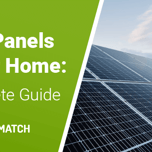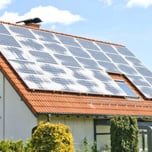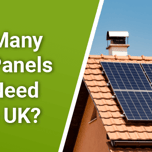Answer these simple questions and we will find you the BEST prices
Which type of solar quotes do you need?
It only takes 30 seconds
100% free with no obligation

Get up to 4 quotes by filling in only 1 quick form

Slash your energy bills by installing solar panels

For the average 2-3 bedroom house
- GreenMatch
- Solar Energy
- Solar Panels
- Solar Panel Grants
Solar Panels Grants and Funding UK (April 2025)

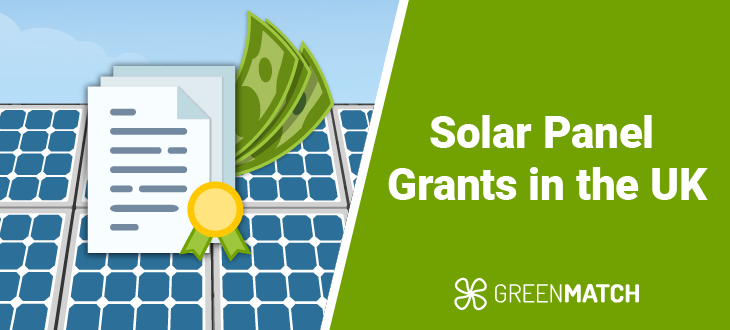
- Solar panel grants like the ECO4 scheme can help consumers get free solar panels in the UK.
- Currently, there is 0% VAT on solar panels, batteries, and other renewable energy products, allowing for a discount of up to £2,850 on the purchase of a 4kW solar system.
- The Smart Export Guarantee potentially allows consumers to earn money by giving energy back to the grid, earning up to £80 to £170 per year on top of energy savings.
- The Warm Homes Plan, available from April 2025, offers funding for new solar installations to social housing residents, lower-income householders, and renters.
The cost of new solar panels might discourage you from considering an installation for your home. However, in the UK, several government initiatives provide partial or full funding for solar panel installations. This guide will walk you through the available solar panel grants, including what’s offered, eligibility criteria, and how to apply.
Looking for a solar installer? Rather than spending hours of time researching, you can get up to 4 competitively priced solar panel quotes from different local installers by completing our 30-second form.
Just click the button below to get started.
- Quotes from local engineers
- Payment by finance available
- Save up to £1,110 per year
It only takes 30 seconds



What UK solar panel funding is available in April 2025
| UK Solar Grants | Run Time | Potential Savings | Eligibility |
|---|---|---|---|
| 0% VAT | April 1st 2022 – March 2027 | £2,850 (for a 4kW solar system panels + battery) | All UK buyers |
| Smart Export Guarantee (SEG) | January 1st 2020 – (indefinite) | Additional £80 to £170 (£520 to £1,360 total energy savings) | Any solar panel system owner (inc. battery and smart metre) |
| Energy Company Obligation 4 (ECO4) | April 1st 2022 – March 2026 | Up to 100% cover for new solar panel installations. | Qualifying low-income households |
| Warm Homes Plan | April 2025 – 2028 | Funding towards new solar installation | Social housing residents, lower-income householders and renters |
| Home Upgrade Grant (HUG) | September 2023 – March 2025 | Up to £10,000, dependent on region or property type | Homes with energy performance rating of D to G |
| Home Energy Scotland Grant and Loan | June 2023 - March 2026 | £5,000 loan funding for solar thermal and hybrid solar PV/water heating | Scottish homeowners |
| Warm Homes Nest Scheme | Indefinite | Up to 100% cover for new solar panel installations. | Homeowners in Wales |
While some of the government initiatives are completely free solar panel grants, others are loans or reductions in VAT that count as solar panel government schemes. Find out more by watching the video below:

Yes! You can get free solar panels through some particular grants and schemes in the UK. While other grants offer funding towards new solar panels, or the opportunity to make money back through an export tariff, certain schemes specifically offer full coverage on new solar panels. Below we’ve provided a brief overview, later we will go into more detail:
- ECO4 Scheme: Available until March 2026.
- Warm Homes Nest Scheme: Available indefinitely.
- Warm Homes Plan: Available 2025 – 2028.
The application process and eligibility criteria for each of these are different, so let’s go over each policy.
0% VAT on solar panels & batteries
- Available from 1 April 2022 – 31 March 2027.
- You could save £2,850 based on the estimated cost of a 4kW system and battery.
- Any UK buyer of certain energy-saving materials and equipment qualifies for a reduced rate.
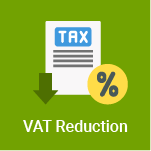
Starting April 2022, homes in the UK can now benefit from zero VAT on the materials and installation of energy-efficient measures. To help households reduce energy bills and increase energy efficiency, the UK government announced a reduction of the current 5% VAT relief on energy-saving measures (e.g. solar panels, heat pumps) to 0%.
In March 2027, the VAT-free period will end, and the rate will return to 5%. If you want to get a head start before it ends, you can begin by comparing solar panel prices to save you the most money. The video below provides a brief overview of the financial incentives on offer:
Benefits of 0% VAT
A typical household with a rooftop solar panel array will save up to an estimated £2,850 in total installation costs for the average 2-3 bedroom house (4kW system + battery), compared to the original 20% VAT.
| System size | Savings (compared to 20% VAT) |
|---|---|
| 3kW | £1,500 – £2,300 |
| 4kW | £2,600 - £3,100 |
| 5kW | £3,300 - £3,700 |
| 6kW | £3,900 - £4,100 |
Additionally, our estimates show potential savings of up to £730 in annual energy expenses for average-size homes (2-3 bedrooms). This brings the break-even period down from about 19 - 23 years to 15 - 18 years.
The 0% VAT also applies to other energy-saving materials besides solar panels, such as heat pumps, biomass boilers, insulation, and more.
Eligibility
The zero VAT rules also welcome the permanent removal of specific eligibility criteria that previously applied to the 5% reduced rate. You can read about this on the government’s website for the full details. The grant makes prices more favourable for consumers by decreasing costs for installers and solar panel manufacturers in the UK. To be eligible, your home and new installation need to meet some specific requirements to benefit from a 0% VAT rate:
- It must include both the installation and product that need to be done together.
- You can also install other goods/services (e.g. insulation) at the same time, but the primary bulk of the work must be for the energy-saving materials.
How to apply for 0% VAT
If the installation and energy-saving material qualify, your installer will automatically apply the 0% VAT. Hence, there’s no need to complete any application process. All you need to do is find an installer.
Instead of spending hours calling multiple installers and comparing prices all by yourself, you can fill out a simple, 30-second form and we’ll get you 4 free, non-binding quotes from the most reliable ones in your region. Click the button below to get started.
- Quotes from local engineers
- Payment by finance available
- Save up to £1,110 per year
It only takes 30 seconds



Smart Export Guarantee (SEG)
- Available indefinitely from January 1st 2020.
- Additional savings between £80 to £170, based on an average tariff rate of 10.8p, bringing total savings between £565 to £1,220.
- Any solar panel system owner (including solar batteries and smart metre) is eligible to benefit.
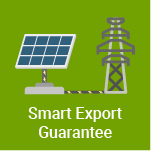
The Smart Export Guarantee (SEG) came into effect on 1 January 2020 and is currently active. It enables small-scale, low-carbon electricity generators, i.e. homeowners, to receive payments for any surplus electricity they export back to the grid.
Although this is not a direct government grant, all licensed suppliers must now offer an export tariff to their customers. Those suppliers with over 150,000 customers are obligated to offer a tariff, while those with fewer can partake voluntarily.
This incentive makes solar panels a great green home improvement project.
Benefits of Smart Export Guarantee
As an SEG Generator, you can shop around for different companies to see who offers the best price per kWh that is exported. You can determine the contract length and rate they offer.
Generally, the rate will range between 1p and 30p per kWh, or 10.8p on average. Because you can choose any SEG Licensee, even one that’s different from your electricity supplier, shopping around for the best rate will get you the best solar panel deal.
See how much you can save based on an average rate of 10.8p in the table below:
| House size | Household electricity consumption | Solar panel system size | Annual savings without SEG | Average annual savings with SEG |
|---|---|---|---|---|
| Small; 1-2 bedrooms | 1,800kWh | 3kW | £485 | £565 |
| Medium; 2-3 bedrooms | 2,700kWh | 4kW | £730 | £900 |
| Medium; 2-3 bedrooms | 2,700kWh | 5kW | £730 | £840 |
| Large; 4-5 bedrooms | 4,100kWh | 6kW | £1,110 | £1,220 |
Eligibility
All homeowners with regular solar panel systems are eligible under the SEG (up to 5MW capacity). In addition, the house must be fitted with a smart meter to measure the exports.
Your solar panel system and installer must be certified under the MCS or equivalent, and your energy supplier may require an MCS certificate.
Currently, there are 27 expert tariffs available in the UK. We’ve listed some of the best in the table below.
|
Best SEG tariff rates |
|||
| Energy supplier | Tariff (p/kWh) | Potential annual savings (£) | Customer Only |
| Octopus Energy (Intelligent Octopus) | 30.31 | £819.1 | Yes |
| Octopus Energy (Flux) | 21 | £747 | Yes |
| Good Energy (Exclusive) | 20 | £740 | Yes |
| So Energy (So Bright) | 20 | £740 | Yes |
| OVO Energy (Exclusive) | 20 | £740 | Yes |
| E.ON (Next Export) | 16.5 | £715.50 | Yes |
| Good Energy (Solar) | 15 | £705 | Yes |
| ScottishPower (SmartGen) | 12 | £684 | No |
| British Gas (Flex) | 6.4 | £644.80 | No |
| Rebel Energy (SEG) | 6 | £642 | No |
These numbers are based on a 4kW solar panel system for the average 2-3 bedroom house, which consumes 2,700 kWh of electricity.
For a comprehensive list of tariff rates, check out our Best SEG Tariff in the UK page.
It's also worth keeping in mind that the SEG applies to MCS-certified installations. Therefore, it does not apply to DIY solar panels in the UK unless they have been properly assessed or installed by an MCS-certified technician.
ECO4 Scheme
- Available from April 1st 2022 – March 2026.
- Provides up to 100% cover for new solar panel installations.
- Applies to qualifying low-income households: Household income is under £31,000, or a household member has a health condition affected by a cold home.
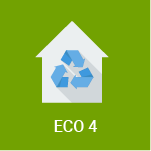
The ECO4 (Energy Company Obligation) scheme came into effect on 27 July 2022, but ECO4 can be applied to eligible measures installed from 1 April 2022 to March 2026. The government has allocated £4 billion – it spreads 1 billion across 4 years– to improve the energy ratings of UK homes and reduce carbon emissions.
ECO4 is distinct from ECO3 in that more people will have the chance to qualify because of ECO Flex, which widens the eligibility criteria compared to previous iterations of the scheme.
Benefits of ECO4 Scheme
The ECO4 scheme offers grants to support energy-efficient home upgrades, helping to reduce emissions, lower energy consumption, and cut electricity bills. This includes funding for solar PV panels. Based on your home's eligibility criteria, the ECO4 scheme could even provide solar panels at no cost to you.
The ECO4 is estimated to upgrade approximately 450,000 homes, mostly to EPC band C.
Eligibility
The government is also letting councils decide on the eligibility criteria based on the needs and specific circumstances of people in the area.
The ECO4 scheme is open to low-income, fuel-poor, and vulnerable households receiving benefits to reduce the upfront cost of solar panels. Eligibility for this scheme does not depend on how old your property is but is primarily determined by the EPC (Energy Performance Certificate) rating of your existing energy systems.
To be eligible for solar PV panels, your home needs to meet these specific requirements:
- Your property requires energy efficiency upgrades (the measures that would benefit your home are determined by a retrofit assessment).
- Combined gross annual household income under £31,000.
- Own your home and live in it, or live in private rented accommodation (requires permission from the landlord).
- Receiving government benefits (e.g. child benefits or income support).
- All-electric homes (on and off-gas) where biomass boilers or District Heat Network have been ruled out.
If you are currently not receiving benefits but are considered low-income, you may still qualify for ECO4 under the ECO4 LA Flex.
LA Flex gives councils the flexibility to determine eligibility criteria in their region — criteria are no longer limited to availing benefits or even based on income and will be tailored to the circumstances of people in the area (e.g., age, number of occupants, number of children, condition of the house, etc.). This means that more people in the UK will be able to get solar panel grants.
How to Apply for ECO4 Scheme
If you’re interested in the ECO4 scheme and want to apply for it, all you need to do is contact a participating energy supply. Companies that provide ECO4 measures include:
- British Gas
- Bulb
- EDF Energy
- Eon
- Octopus Energy (including Co-Op Energy)
- Outfox the Market
- Ovo Energy (including Boost and SSE)
- Scottish Power
- Shell Energy
- So Energy
- Utility Warehouse
- Utilita
They will then conduct a telephone assessment by asking you questions about your home and your heating needs. Then, you can arrange a date for an installer to visit your home to confirm whether it’s suitable for ECO4 and which energy-efficient measures are most suitable.
Unsure if your home qualifies or what price you'll get? Our service simplifies the process—just complete a quick 30-second form to get quotes. Maximise savings with grants by comparing up to 4 custom solar installers in your area. Click the button below to start!
- Quotes from local engineers
- Payment by finance available
- Save up to £1,110 per year
It only takes 30 seconds



Warm Homes Plan
- Available from April 2025 – 2028.
- Offers funding towards new solar installations, low-income households and renters will be eligible to receive up to £30,000 each for home improvement projects.
- Applies to social housing residents, lower-income householders and renters.

The Warm Homes Plan launches in the UK in April 2025. The scheme, announced as part of the new Labour government's budget, offers targeted financial support for solar panel installations to reduce energy bills and promote renewable energy adoption.
This initiative builds on the government’s commitment to tackling fuel poverty and cutting carbon emissions. The program aims to make renewable energy more accessible to underserved communities, delivering energy-efficient upgrades to thousands of UK households by the end of 2028.
Benefits of the Warm Homes Plan
The grants issued through the scheme can be spent on energy performance upgrades and low-carbon heating for homes in England and Wales. Starting in 2025, low-income households and renters will be eligible to receive up to £30,000 each for home improvement projects.
The solar installation grant helps households lower energy costs through renewable energy, supports the UK's carbon reduction goals, and makes solar technology accessible to social housing tenants, low-income families, and renters who might not otherwise afford it.
Eligibility
Eligibility for the Warm Homes Plan solar installation grant includes:
- Social Housing Residents: Tenants in social housing properties are eligible for funding to install solar panels and benefit from renewable energy solutions.
- Lower-Income Households: Households with a combined gross annual income under £31,000 qualify for support to reduce energy costs.
- Renters: Renters are eligible with landlord permission.
Eligibility is further determined by:
- The energy performance needs of the property are assessed through a retrofit evaluation.
- Households currently receiving government benefits (e.g., Universal Credit, Child Benefits) or those identified as low-income but not receiving benefits.
- Regional council discretion under a flexible approach tailored to community needs, allowing more people to qualify.
How to Apply for Warm Homes Plan
Applying for the grant goes as follows:
- Check eligibility: Visit the Warm Homes Plan page of the UK government's website or consult your local council to verify your eligibility criteria.
- Submit application: Applications will open in April 2025 via the Department for Energy Security and Net Zero’s website or at designated centres in your area. Ensure you provide proof of eligibility, such as income details or benefit status.
- Assessment and Installation: After your application is approved, a professional assessor will evaluate your property to determine its suitability for solar installation. Certified installers will then complete the installation process.
Home Upgrade Grant (HUG2)
- Available from April 1st 2022 – March 2026.
- Provides up to 100% cover for new solar panel installations.
- Applies to qualifying low-income households: Household income is under £31,000, or a household member has a health condition affected by a cold home.

The second phase of the Home Upgrade Grant is currently underway, providing low-carbon, energy-efficient heating and renewable energy. While the exact measures need to be approved by a local council, they suggest improvements that include installing solar panels.
If you pass the eligibility criteria, the local council will then arrange a home survey to examine how your home could be made more energy efficient.
Benefits of the Home Upgrade Grant
The amount of finance you receive is regionally dependent, so there are no fixed rates. However, it operates in 45 select local authorities, where residents can potentially receive up to £10,000, which makes it a very lucrative grant. The amount of financing is determined by the specific council in your area, so check with them to see what you can receive.
Eligibility
Slated to run till March 2026, the Home Upgrade Grant is for homes that are:
- Low-income (total household annual income of £39,000 or less before housing cost and bills deduction)*
- Off the gas grid
- Currently have an Energy Performance Certificate (EPC) between D and G
- You live in select councils (you can check your region on the official government website here)
- If the residents are on several different benefits
*Note: if your income exceeds the £39k threshold, you can have an interview with your local authority, and they will decide if you qualify regardless based on other factors.
Solar panel grants in Scotland, Wales & Northern Ireland

Certain grants are regionally specific, operating outside of England while still being available in other parts of the UK. Let’s briefly cover two of these.
Home Energy Scotland Grant and Loan
- Available from April 1st 2022 – March 2026.
- £5,000 loan funding for solar thermal and hybrid solar PV/water heating.
- Any Scottish homeowner is eligible to apply.
Launched in June 2023, the Home Energy Scotland Grant and Loan offers £6,000 total, with £1,250 as a grant and another optional £4,750 as a loan. As of June 2024, this scheme is no longer providing new referrals for solar panels and solar energy storage systems. If you've applied before this time, your application will still be processed.
Funding for the grant applies to those who meet all of the following criteria:
- Those living in a home not heated by mains gas (including oil, coal, LPG, or electric heating).
- Have an Energy Performance Certificate (EPC) between D and G - Homes that do not have an EPC rating will also be provided with a free assessment.
- Meet the low-income threshold (below £36,000) or live in the most economically deprived areas (IMD 1-3).
This grant, when combined with the optional loan, can cover the potential costs of a 3kW system. This would be ideal for a 2-bedroom house or a small 3-bedroom one. It is one of the most lucrative solar panel grants in Scotland.
Warm Homes Nest Scheme
- Available indefinitely.
- Provides up to 100% cover for new solar panel installations.
- Welsh residents with poor energy efficiency and who receive a means-tested benefit or have a chronic respiratory, circulatory or mental health condition.
The Warm Homes Nest scheme by the Welsh government provides free advice and funding to help improve residential energy efficiency. Homeowners and private renters who are eligible may even qualify for free home upgrades, including solar panel installation. The programme aims to reduce energy costs and improve comfort for households with low energy performance ratings.
You may be eligible for free solar panels if you meet all of the following criteria:
- You receive a means-tested benefit or have a chronic circulatory, respiratory, or mental health condition
- You own or privately rent your home
- Your property has poor energy efficiency and high heating bills
How much do solar panels cost in the UK with a government grant?
Depending on the grant, you can get partially or fully funded solar panels. The ECO4 scheme can potentially get you free solar panels (or allow for partial payment), while other schemes like Home Energy Scotland can offer grants of up to £10,000, which can cover the cost of a 4kW system.
The yearly return on investment will be about £730 to £1,110, depending on the size of your home and solar panel system.
| Household size | System size | System cost + installation | Annual savings | Break-even period | Savings after 25 years |
|---|---|---|---|---|---|
| Small; 1-2 bedrooms | 2kW | £2,500 - £3,500 | £485 | 6 years | £12,125 |
| 3kW | £4,500 - £5,500 | 7 years | |||
| Medium; 2-3 bedrooms | 4kW | £5,000 - £6,000 | £730 | 5 years | £18,250 |
| 5kW | £7,500 - £8,500 | 11 years | |||
| Large; 4-5 bedrooms | 6kW | £9,500 - £10,500 | £1,110 | 8 years | £27,750 |
A 4kW solar system, priced between £5,000 - £6,000, can save you around £730 annually and break even in about 5 years. It's important to also note that these prices are specific to on-roof solar panels. The cost of ground mounted solar panels can be a bit higher due to the additional equipment and processes required.
Grants like ECO4 can help reduce installation costs, making solar panels more affordable. Full coverage on solar panels would mean you'd profit from these annual savings as soon as you install them.
With the Smart Export Guarantee (SEG), you can earn up to £108 a year based on an average tariff of 10.8p/kWh.
Grants are typically means-tested and vary based on your region, income, and benefits eligibility. If you're considering solar energy, GreenMatch can help you receive up to 4 free, non-binding solar panel quotes in the UK, connecting you with trusted installers to save you hours of time and effort.
All you need to do is click the button below and answer some questions about your heating demands. We’ll take it from there for you.
- Quotes from local engineers
- Payment by finance available
- Save up to £1,110 per year
It only takes 30 seconds



Frequently asked questions
Yes, you can get a grant for solar panels in the UK to help reduce the cost of your energy bills by up to £1,000 annually, or even a fully free solar PV panel system. There are currently solar panel funding options that you may qualify for.
Yes, it is possible to get free solar panels in 2025 through the ECO4 Scheme, but you need to meet specific criteria, such as income and benefits. There have been other free solar panel grants in the past, but they have since expired.
Through the Smart Export Guarantee in the UK, you can earn as much as 11p per kWh generated by your solar panel system. How much money you earn depends on which SEG-licensed electricity supplier you have. On average, you could save an additional £170 on top of your annual energy bill savings.
Yes. Farmers can easily obtain grants to alleviate their energy costs. The specific grants can depend on which region they are in and what income-related or employment factors affect eligibility.
Yes. Thanks to the Smart Export Guarantee, you can make money by giving back to the grid. The exact rate depends on your energy provider.

As a writer with a deep understanding of low-carbon energy systems, Hannah aims to breakdown knowledge barriers and share insights to empower individuals in their pursuit of creating more environmentally conscious homes.

We strive to connect our customers with the right product and supplier. Would you like to be part of GreenMatch?

- Quotes from local engineers
- Payment by finance available
- Save up to £1,110 per year
It only takes 30 seconds




